The CBD Expert Series: PMS, Periods, & Menopause with Sex Educator Kiana Reeves
Page Overview
This is Part 1 of our exclusive Expert Series Q&A with sexual and feminine health expert, Kiana Reeves. Be sure to check out Part 2: CBD for Sexual Health & Pleasure afterwards.
For this two-part Expert Series interview, Tierney Brannigan of CBD Oil Review sat down with Kiana Reeves, Chief Brand Educator at Foria Wellness, to talk pain, pleasure, and everything in between. Kiana has over 10 years of experience as a sexual wellness and holistic health practitioner, healing people’s bodies and minds, inside and out, to elevate their experience in the bedroom, birthing room, and beyond.
It should come as no surprise that she now serves as a primary educational resource for the one of the most sex-positive and progressive CBD brands out there. Foria’s innovative products, including their CBD suppositories and arousal oil, have brought both CBD and sexual health to the forefront of mainstream culture.
In Part 1 of this series, we’re covering menstruation—that miraculous, monthly cycle that, despite being a sign of good health, can bring both physical and emotional pain. That’s right, we’re talking PMS, periods, and menopause, and how CBD may offer relief from the less-than-pleasant effects that result from hormonal changes.
Tierney Brannigan (CBD Oil Review): Would you mind telling us a little bit about your background in women's health?
Kiana Reeves (Foria Wellness): Sure. About 10 years ago, I started out as a doula, and for 10 years, I've been working with birth and postpartum. I've always had an interest in the lifespan of the female sexual continuum, which is everything from the onset of puberty through your childbearing years, and then through menopause. We go through so many changes that it's just been a lifelong passion of mine, and sexuality is a huge part of that.
After I became a doula, I had two children, and I really experienced a shift in my relationship with who I was in that moment as a sexual person. There were so many external needs that I was always meeting I really went into this period where I didn't really have a libido, and I didn't feel like a part of myself was existing in the same way as it used to. That's when I became inspired to understand more about it and study to become a somatic sex educator in particular.
I met a woman named Kimberly Johnson who does a lot of work on the fourth trimester, but also she does intravaginal pelvic work and helps people recover from scar tissue, and also emotional trauma, and she's a somatic sex educator. I studied with her and her mentor, Ellen Heed, in the same line of work, training to do intravaginal pelvic work specifically with birth injury, and also working with the emotional nervous system.
Then, I studied to become a sexological bodyworker, which is someone who provides a hands-on somatic sex education for people to reorient and relearn their bodies, particularly their pelvis and their genitals through a hands-on approach.
Cool, very cool. I'm hearing a few terms that I'm not super familiar with, can you break them down? “Doula,” “somatic sex educator,” and “fourth trimester.”
A doula is someone that attends births and supports birthing parents in a nonmedical way. It's the emotional and environmental support for the mothers and birthing people that we've always had culturally and we've been separated from in the last few hundred years.
Somatic sex educator, it's basically being a sex educator but working with the body as the main tool of understanding.
The fourth trimester is the three months after birth where it's almost like the baby is gestating. It needs care and holding, and the mother needs recovery support, or the birthing parent needs recovery support.

A doula, also known as a birth companion, birth coach, or post-birth supporter, is a pillar of physical and emotional support for women going through pregnancy.
Would you say it's safe for women to use CBD during all of the different stages in their sexual life cycle, from the first time they get their period all the way through giving birth, and then eventually menopause? Are there any risks associated with using it?
Well, when talking about pregnancy no one is really sure about the risks, if there are any, because there isn’t enough science behind the use of CBD in pregnancy. That's something that, as of now, is being determined by personal choice in the same way that people who use cannabis during pregnancy are having to do so by personal choice. That's because there have been real risks in the past in doing studies on pregnant people. If you look at the pharmaceutical industry, there were a lot of pharmaceuticals that were made that were really detrimental in the last hundred years to pregnant woman and, to the babies.
I don’t think many research institutions want to go and say , “Well, let's test this on one of the most susceptible populations.”
I think it will be a long time before there's actual research around the safety and efficacy of CBD during pregnancy from double blind studies – there may be a lot more anecdotal evidence emerging first. That said, I personally know many people that use it, but that's officially not a position that anyone can take at the moment.
Where do you see research on women’s health and CBD heading in the future?
There's a lot of key areas, and I think with the endocannabinoid system, we're just at the tip of the iceberg of really being able to understand how influential it is in so many systems within our body.
Because when you're talking about homeostasis, you're really talking about this fundamental capacity to bring the body back into balance so that it's resourced enough to do what it needs to do on its own. One of the most amazing aspects of using cannabinoids as medicine is that they are working with the nervous system, working with stress and anxiety, working with inflammation, pain, appetite, etc. All of these parts that we see as different systems are indeed part of a functional whole.
It's all an expression of one fundamental thing. We have a tremendous amount of testimonial feedback from our customers, and there's emerging research around using cannabinoids as a really effective way to work with menstrual cramps, endometriosis, painful penetration, to work with this whole host of experiences that many people are having. Even just balancing stress in the body can work in a different pathway and support more hormonal balance.
Is there a correlation between CBD and hormones?
That's not a claim that I would make and say, “Take CBD and balance your hormones,” but there is a correlation between taking CBD to decrease inflammation and decrease stress, which are the two biggest indicators towards inflammatory-based diseases and hormonal imbalance. Emerging research suggests CBD does impact cortisol, estrogen, melatonin, and a few other glands producing hormones like the pancreas.
There really are huge implications, we just don't have all of the science behind them yet. But, we are getting feedback around the tremendous benefit that people with a uterus or a vulva are experiencing over their lifespan.
PMS, Periods, and CBD
What are some of the more common ailments that people with a uterus or vulva experience during PMS or their period, and how they're using CBD to treat those symptoms?
With PMS and menstrual cramps in general, it's interesting. The last pharmaceutical invented specifically for menstrual cramps was in 1933, a rebranded a hiccup drug, which became Midol. That was almost a hundred years ago, and most people who have these debilitating menstrual cramps are incapacitated for one, two, or sometimes three days a month.

Newspaper clipping of a Midol ad from the February 6, 1933 edition of the Akron Beacon Journal. Image courtesy of Newspapers.com.
It’s something that the medical establishment as a whole hasn't paid much attention to. Half of the population of the world menstruates during a large portion of their life. Sometimes, they spend longer than half their life menstruating. There's a real significant amount of time that people experience tremendous amounts of pain, some blacking out, throwing up, laying in bed all day with their water bottles.
There hasn't been a ton of movement to really support or help through that other than taking a Tylenol or a NSAID [nonsteroidal anti-inflammatory drug]. For us, what we're learning about CBD in general, about cannabinoids as a really efficient and effective natural alternative to some of those pain medications, is very inspiring.
For example. We got an email last night actually from a consumer who has incredibly painful periods because she has endometriosis, and she said for the last 12 years, she had been taking upwards of six Tylenol every day of her period just to survive it.
The first month that she tried our suppositories, she only had to take four Tylenol, and this month, she didn't have to take any.
This is the unsolicited feedback that we are getting on a very regular basis. Of course, it's not double-blind scientific research, but we're talking a collection of thousands upon thousands of emails that have come in, in the last five years about the effectiveness of using CBD internally. Our suppositories are going straight to the tissues that are experiencing the inflammation, the contractions, and the pain.
It's relieving in a really localized way and I think it is tremendously beneficial to be able to apply the medicine exactly where it's needed.
Could you talk a little bit about what endometriosis is?
Yeah. Endometriosis is when the endometrial lining of the uterus grows outside of the uterus. Every month the lining of our uterus builds up with blood and then we shed it. What happens with endometriosis, which is usually preceded by a hormonal imbalance or an excess of estrogen, increases the rate and the amount that we produce of the endometrial lining, and it actually ends up growing outside of the uterus.
You can have little endometriomas all around your pelvis, which cause adhesion and scar tissue, and can really create a tremendous amount of pain for people.
Is it caused by hormonal imbalances?
It is caused by a number of things. We have so much exposure to xenoestrogens, phytoestrogens, and all of these different chemicals that are really impacting our hormonal regulations, for example, toxins in the environment like micro plastics, toxins in our food sources such as pesticides. Who knows what exactly the contributing factor is for each person. It's super individual, and not entirely environmental but as a hormonal example there are a lot of environmental factors that are going to contribute to an increased amount of estrogen in the body.
Thank you for explaining that. Can you tell me a little bit more about PMS, and whether CBD might be able to help with some of the more common symptoms?
There hasn't been, again, a large study focused on PMS that I know of, but what a lot of people experienced with PMS is anxiety, stress, mood instability, tenderness of the breasts, and just feeling this sense of deep discomfort in the body. We do have feedback from our customers that are using our Basics Tonic, which is an oral CBD tonic that is working to support the entire endocannabinoid system, that it's helping with certain PMS symptoms like sleep, pain, mood, anxiety etc.
If there's mood complications or you're feeling that high highs and low lows during your menstrual cycle, supporting that regulation by getting a very high quality broad-spectrum CBD tonic can very much support those waves, help them become less intensely jolting.
Really, anything that supports the endocannabinoid system in general could be useful for PMS. It's such an important regulatory system, and if you are endocannabinoid-deficient or if you have excessive stress or anxiety levels in your life, you’re going to feel your hormone fluctuations a lot more because you don't have that buffer of those endocannabinoids creating a little bit more balance and regulation.
Have you heard of CBD tampons and do you have an opinion on them?
Yeah. We obviously make suppositories. I think we were the first company in the cannabis industry that made anything that was going to be inserted vaginally or rectally, with the intention of allowing that to absorb locally into the tissues.
From our perspective, tampons are meant to absorb things. I think we're not entirely sure about how a tampon that's meant to absorb something is actually going to work in the reverse and allow CBD to then absorb back into your tissues.
That said, anything that is innovative and showing promise, and getting good feedback from people who are experiencing menstrual cramps, we’re interested in. It's just not something that we are certain works just yet.
The last thing I want to ask about PMS and periods is what guidance would you provide for someone who is menstruating, who has never used CBD before, but wants to try to help mitigate say menstrual cramps or mood changes that come with PMS?
Right. Well, I'd say there's two primary ways that I would use CBD for myself to help with menstrual cycle regulation, and harmonizing what's already happening in my body. When you're talking about CBD, you have to look at the ways that it's being applied.
Cannabinoids are fat-soluble molecules. When you're using a suppository locally, it's going to stay fairly localized. Some of it will get into the bloodstream, but most of it stays localized in the tissue. For the immediate relief of menstrual cramps, I would say support with suppositories would be my number one go-to. We have no evidence of side effects or contraindications at this point, though it doesn’t work for everyone, unfortunately.
The second thing I would say is that if there's mood complications or you're feeling that high highs and low lows during your menstrual cycle, supporting that regulation by getting a very high quality broad-spectrum CBD tonic can very much support those waves, help them become less intensely jolting.A comprehensive approach would be both using the localized suppositories and then incorporating something that is going to support the endocannabinoid system in a whole perspective, not just in the pelvis itself.

From left to right: Foria’s Awaken Arousal Oil, Flow Multi-Botanical CBD Vaporizer, Basics Tonic, Basics Menstrual Suppositories
You said “broad-spectrum.” Can you talk about that a little bit?
There's a couple of terms that people are familiar with. There's full-spectrum, broad-spectrum, and isolate. Isolate is when the plant is stripped down of all of the other beneficial cannabinoids and it's only the CBD itself. Plant terpenes are taken out, other beneficial plant compounds are taken out. It's cheaper, and so that's what you're going to get in a lot of CBD products that are not as expensive but also probably not as beneficial.
The broad-spectrum is when you take the whole plant extract but there's no THC within the formula. The THC is taken out, which is the psychoactive component, and then the rest of all of the other beneficial cannabinoids promote something called the entourage effect, which is essentially nature's intelligence working together for an even more potent benefit.
Then the full-spectrum includes the THC in whatever ratio the extract is made in. Sometimes that's as little as 0.3%. Sometimes it's 1:1. You really have to understand ratio and cannabinoid blends to learn more about the effects and benefits you're going to receive from those.
What’s the entourage effect?
It's the concept that a plant works the best by staying close to its wholest form. CBN, CBG, plant terpenes, other beneficial plant compounds, along with the CBD, are really where you're getting the most medicinal benefit.
Using CBD During Menopause
Do you have any experience with people using CBD during menopause?
Yes, that's a huge, huge population of our customer base actually. Menopause is not something that a lot of people talk about in society or socially, and even with each other sometimes. Many of our customers share with us that they felt really caught off-guard. They didn't realize that their vaginal tissues were going to change so much, the hot flashes, the night sweats, the risk of osteoporosis, the mood swings. Sometimes there's even vaginal muscular atrophy, or a tightness that happens that makes penetration and sex really painful.
With Foria's Awaken arousal oil in particular, we have a really, really amazing growing customer base using our product to actually be able to have super enjoyable, well-lubricated, heightened sensation, enjoyable, penetrative sex. That's moving to us. Menopause is not something that a lot of people talk about in society or socially, and even with each other sometimes. Many of our customers share with us that they felt really caught off-guard.
We don't just have CBD in Awaken; we also have Kava and other plants that have endocannabinoid activity, and also they work within the nervous system. For anyone experiencing pelvic or genital issues in relation to their sexuality Awaken is a game changer.
We're also getting amazing feedback about our Basics Tonic from the menopausal demographic, using it for the hot flashes and the mood swings, and support with sleep. That's really inspiring to us as well. Again, there's not much science behind it, but we do really appreciate the testimonial collection that we have at this point stating that this is impacting a huge number of people.
What causes hot flashes, and how does CBD help prevent them or reduce their severity?
Well, there's a lot of things that happen within menopause, but the key leader is the decline in estrogen production. That is the main contributing factor to my knowledge (and I'm not perfectly versed in the hormonal nuances of menopause) but that decrease in estrogen is impacting body temperature. It's also impacting all of the other hormonal cascades and causing fluctuations in the body’s thermostat, and those fluctuations are what really are causing the heat.
The decline in estrogen is also what changes the vaginal tissues from feeling moisturized and supple to sometimes becoming more difficult to experience lubrication, and more thin and easily torn. A lot of people don't realize until you're in the midst of a big hormonal transition that they play such a huge, huge role in our day-to-day experience of our bodies.
For someone who has never used CBD before but wants to try it to help with menopause, what would you suggest?
Awaken is a topical arousal oil and it's made with CBD, along with eight other organic plant extracts. That's really a synergistic blend and that's applied topically to the labia and intravaginally, and on the clitoris. We really created the formula to support the body's own capacity for arousal. It's really about supporting blood flow to the erectile tissue network. Through that, heightened arousal allows for a natural increasing of lubrication and heightened sensation by your own body.
Then I would say supporting your endocannabinoid system again is a core root to bringing harmony and balance to all systems, including our hormonal balance, and so taking a daily oral CBD tonic to support that sleep and that inflammation, and that arching towards homeostasis, will support your experience in general.
Read the next installment in Kiana's Expert Series Q&A – Part 2: CBD for Sexual Health & Pleasure.
More Expert Series Interviews

The CBD Expert Series: Jackie Bowen on Mislabeled & Misleading CBD Oil
Read More
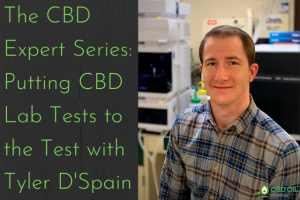
The CBD Expert Series: Putting CBD Lab Tests to the Test with Tyler D'Spain
Read More

MasterChef Nick Nappi's CBD Apple Cider Donut Hole Recipe
Read More
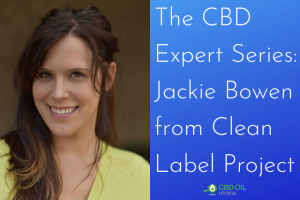
The CBD Expert Series: Jackie Bowen from Clean Label Project
Read More

The CBD Expert Series: Certificates of Analysis 101 with Dustin Jones
Read More
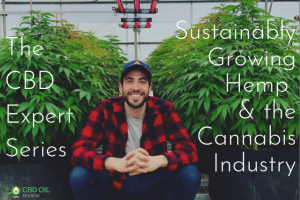
The CBD Expert Series: Sustainably Growing Hemp & the Cannabis Industry
Read More
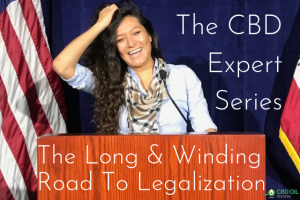
The CBD Expert Series: The Long & Winding Road To Legalization
Read More
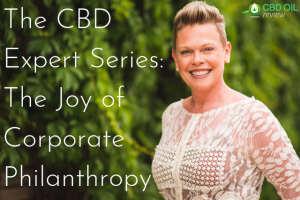
The CBD Expert Series: The Joy of Corporate Philanthropy
Read More
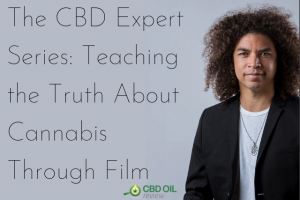
The CBD Expert Series: Teaching the Truth About Cannabis Through Film
Read More
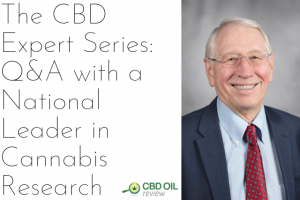
The CBD Expert Series: Q&A with a National Leader in Cannabis Research
Read More
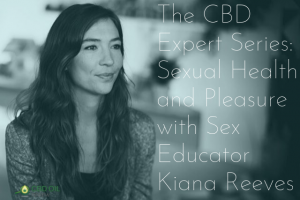
The CBD Expert Series: Sexual Health and Pleasure with Sex Educator Kiana Reeves
Read More
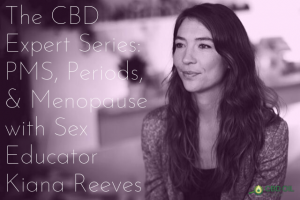
The CBD Expert Series: PMS, Periods, & Menopause with Sex Educator Kiana Reeves
Read More
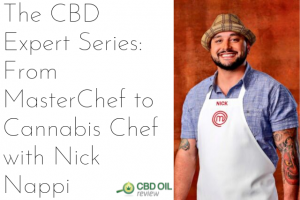
The CBD Expert Series: From Masterchef to Cannabis Chef with Nick Nappi
Read More
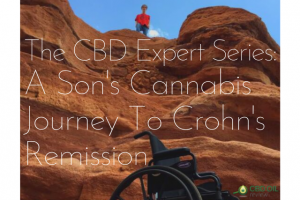
The CBD Expert Series: A Son's Cannabis Journey To Crohn's Remission
Read More

The CBD Expert Series: Your Friendly Neighborhood CBD Chiropractor, Dr. Paul Paez
Read More
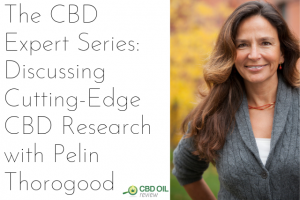
The CBD Expert Series: Discussing Cutting-Edge CBD Research with Pelin Thorogood
Read More
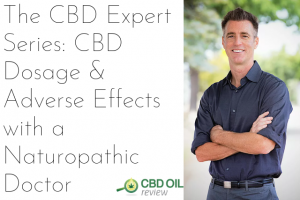
The CBD Expert Series: CBD Dosage & Adverse Effects with a Naturopathic Doctor
Read More

The CBD Expert Series: Talking Drug Tests with a Lab Tech
Read More
Opinions expressed in this article are those of our guest (the interviewee) and not necessarily of CBD Oil Review.
6 Smart Questions to Ask BEFORE You Buy CBD
Get the Ultimate CBD Buyer’s Guide and you won’t look at CBD the same way again!



 search
search